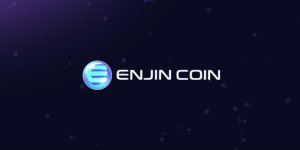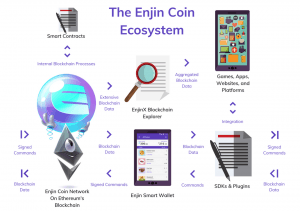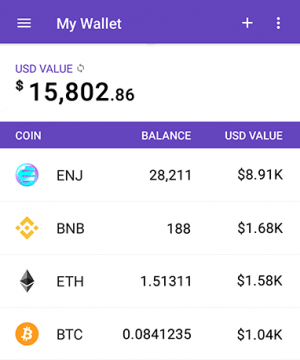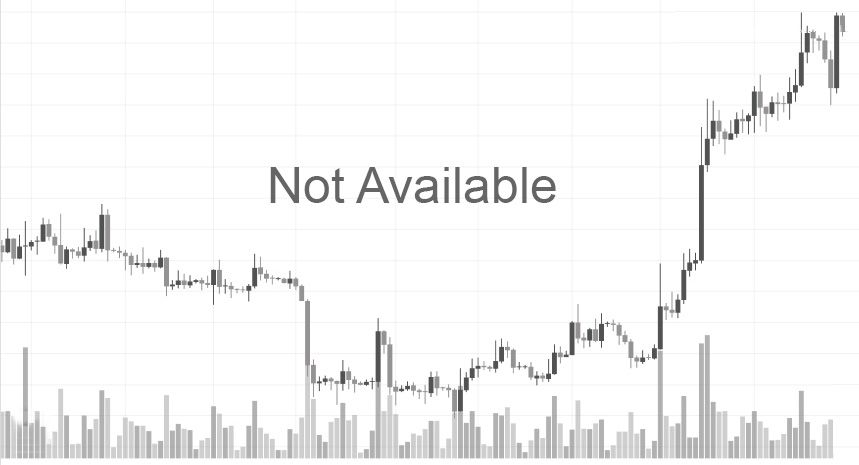Enjin coin (ENJ) is the cryptocurrency of the Enjin platform dedicated to supporting easier creation of gaming content and economies based on virtual assets. The platform aims to posit blockchain as the backbone of future gaming ecosystems.

What is Enjin Platform?
Hosted by the Singapore-based company of the same name, the Enjin platform prides itself on serving the community of more than 20 million gamers. The majority of them are grouped into some 250,000 individual communities built around specific games. Working with large communities consisting of technologically-minded users prompted the Enjin team to consider creating a smart contract platform and an Ethereum-based token which would be focused on the needs of both players and developers within these communities.
The team’s mission statement was summed up in the document called the Enjin Coin Manifesto and its main points explain how the coin aims to change the current state of existing gaming environment:
- Game developers are forced to create content which reflects the short-term interests of publisher’s shareholders instead of what they or the gamers want. Franchising of the gaming industry has led to the proliferation of an “endless sequence” of content which is too focused on in-game microtransactions, loot boxes and time-limited offers. Enjin coin aims to make gaming less focused on what its creators describe as “draining” the players’ money. Freed from the pressure of publishers, the developers would be able to focus on creativity and the community’s demand. Enjin aims to integrate game development and blockchain and provide the developers with the tools to create custom tokens and contracts on its platform.
- Gamers and content providers often do not see eye to eye when it comes to game monetization models. ENJ developers describe the existing game development ecosystem as dominated by the monopolies which continue to impose their old monetization models which reportedly antagonize the users and stifle creative freedom of developers. Enjin platform hopes to get rid of the pay-to-win gaming models and create an ecosystem consisting of virtual worlds in which the users receive rewards based on their skills, creativity and talents. This model is described by the ENJ team as “ethical monetization” of games.
- The current model of distributing virtual rewards in games is expensive, prone to frauds and restricted to centralized servers. The Enjin platform aims to lend itself to the creation of several digital “realities” in which players would be allowed to keep their rewards, characters and assets across various game universes existing on a single platform. Tokens and other gaming assets created in this manner would also have real-life value and include support for being kept on an immutable chain, fully resistant to server failures and leaks of cloud-stored data, hacking attacks, malicious actions of other gamers etc.
What Is the Enjin’s Ecosystem Made Of?
The Enjin project aims to build an entire ecosystem consisting of components which should support the creation of a novel business and technological model in the gaming industry. In addition to the Enjin Coin which operates as an ERC20 token developed on the Ethereum platform, the project would include the following components:
- Various software development kits (SDKs) which the developers can use for easier creation of game content. The same tools would be used for the establishment and management of communities built around particular games, such as Minecraft clans.
- Enjin platform for the creation of tokenized gaming assets. One of its features is Enjin Mintshop, which allows for the streamlined creation of custom game tokens.
- Efinity. Enjin platform is proceeding with the implementation of the channel-based solution similar to Lightning Network which would allow the network to improve its scalability potential.
- EnjinX Explorer. Ethereum-based explorer allowing its users to search transactions, blocks, addresses and coins. According to the team members, it was designed to speed up the adoption of blockchain technology by the mainstream users.
- Enjin payment gateway.
- Enjin Wallet.
ENJ Coin Supports Creation of Virtual Assets
One of the key value proposals of using the Enjin Coin is implementing it as the basis for the creation and management of virtual assets related to games. Since the ENJ coin can play the role of the parent currency, the Enjin platform users can create unique virtual goods which are relevant to a particular gaming community:
- In-game items. These refer to items used by players during playing sessions, such as items which grant bonuses to particular abilities of their characters, such as virtual weapons, loot items etc.
- Custom currencies. Being backed by the Enjin Coin means that custom-made currencies can reap the benefits offered by blockchain (such as those relating to fees, security, transaction speeds) while keeping their unique identity based on the game they are made for. The platform offers its own token supply models in case the users do not want to code their own smart contracts.
- Privilege tokens. Custom coins can be utilized as tools for the management and delegation of power across the Enjin-based games and communities. In games, for example, access to virtual chests with powerful and rare items can be protected by putting them behind “keys” in form of privilege tokens. Likewise, at the community level, the same tokens can be bought from website owners in exchange for the right to advertise one’s products on the site’s message boards.
All of these virtual assets are available for exchange with the ENJ coin whenever a user holding these tokens desires to do so. This is made possible thanks to the ability of the smart contract’s Mint function which enables storage of all ENJ coins which participated in the creation of custom coins. Creation of custom virtual goods will also drive down the number of ENJ coins in circulation, thus protecting the underlying economy and value of the Enjin ecosystems in the long run.
The exchange between ENJ coin and custom-made virtual assets will be done at the exchange rate which was valid at the time the tokens were originally minted. In addition, this transferability should make it possible to exchange these assets across various platforms in a flexible manner.

How Can One Mint Custom Coins?
Minting process for the creation of custom coins will be done via “Mint” smart contract feature which is to be made accessible via web, mobile and API-based user interfaces. Minting of custom coins depends on their capability to meet the following criteria for passing off as a genuine asset on the Enjin platform:
- Name
- Icon
- Maximum Supply
- Decimal Places
- Exchange Rate
- Access List
- Data
Upon their creation, the Mint smart contracts are cloned and recorded with the help of a smart contract’s Registry function. The custom assets can be minted by any user found in the Access List which is a part of the contract, provided that they send their ENJ Coins to the newly created Mint smart contract.
The registration process allows for the recognition and storage of all related custom created assets by the Enjin’s smart wallets. Each of the above parameters of these assets (such as their names or symbols) can be modified at any time by the user authorized as their owner under a particular smart contract.
Custom Game Items Made with Enjin
Minting custom coins on the Enjin platform uses the same mechanism for the creation of unique items found in games, such as rare weapons and cards, unique heroes etc. For example, one ENJ coin may be turned into a branded token which serves as a “protection” or “attack” in-game item, depending on the game scenario. In this case, Enjin Coins serve as the basis for minting custom coins which have the properties of genuine game items with economic value attached to them.
As parts of the gaming ecosystems, these unique items can be treated as being non-fungible assets. Their uniqueness can be derived not just from a set of particular attributes but by linking them to unique data, such as the name of players who own the item, the name of the enemy it was taken from as loot, or just any other irreproducible piece of information.
Virtual Asset Trading on Enjin
Decentralization of virtual assets allows the Enjin platform to enable trading with the custom assets across multiple communities and games, just as long as they are supported on it. This means that the players can trade their items outside the gaming environment in which an asset was created. Custom coins created with the help of Enjin platform should be compatible with external digital asset exchanges which provide support for Ethereum tokens.
In order to strengthen the future economy based on game item trading, the Enjin team plans to focus on creating a fully functional virtual asset marketplace, with features such as auctions, P2P trading and setting of wish lists.
How Do Enjin Smart Wallets Work?
The Enjin Smart Wallet are supposed to help with linking all components of the platform’s ecosystem together. They provide backing for custom and virtual assets with the value of ENJ coin and are linked to the user’s Ethereum address. Since Enjin wallets are used as an interface for exchanging custom and Enjin coins, they play a key role in protecting the liquidity of the entire Enjin platform.
Smart wallets allow one to trade both coins and created items with other users outside the gaming environments. This is done in the following manner:
- A user can initiate transaction by sending a transaction request to another user.
- For each transaction request, trusted platforms (games or websites which the users designate as such) on the network instantly send notifications to the user’s smart wallet. Users can also predefine the rules which should prevent unwanted transactions from taking place.
- Users receiving transaction requests can either approve or reject them, with the approval leading to the creation of transaction on the blockchain.
- Once the transaction is approved, the wallet will use the trusted platform API to oversee the processing of transactions. While waiting for the full approval of one’s ownership over a custom asset, the platform will support the use of a placeholder or a non-tradable asset in its place. If the transaction has to do with a currency, the user’s account balance will be automatically updated in-game, with the segments of unapproved funds will be locked away until the required number of approvals is reached on chain.
To protect its security, Enjin wallet features the support for Enjin Secure Keyboard and the “rule of two” encryption system. This proprietary keyboard is supposed to prevent the use of keyloggers and data sniffing. At the same time, the rule of two encryption is based on the use of two independent cryptographic layers for the protection of stored keys and data: Hardware AES encryption on the lower level and software encryption at the application layer.

Enjin’s Payment Gateway
The Enjin platform SDK also features support for a full-blown gateway for decentralized payments. This segment allows the Enjin users to manage invoices and refunds, create customized shopping carts and use other features related to payment. If a user has a website which they plan to integrate with the Enjin platform, they are free to use a payment widget which supports transactions made with Enjin Coin and custom currencies, or both of these options.
Payment services are accessible in exchange for a symbolic Ethereum-based fee which is charged for each transaction. Combined with the system of trusted platforms, Enjin’s gateway offers support for making automatic payments to platforms designated as such. In addition to fostering trust, this system is supposed to make the payments faster than what is offered to the regular subscribers.
What is Efinity Network?
Back in 2018, Enjin platform announced the creation of the Efinity network as its response to the scaling issues which are often mentioned in the context of the blockchain. It is described as the “Lightning Network Made for Gaming” and is based on the network of game channels which perform transactions between millions of players and game servers. It is planned for these channels to enable each game to perform a “nearly infinite” amount of transactions, at almost no cost and at previously unreachable speeds. In addition, these transactions will be both trustless and verifiable on the Ethereum blockchain.
Once fully implemented, the network’s features are also supposed to help the developers develop game content much faster, including MMO game universes, collectible card games, dApps and others.
Enjin Coin Availability
The ICO for Enjin Coin took place in late 2017, allowing the project team to raise about USD 35 million in the process. As of January 2019, the currency’s market cap amounted to USD 23 million, down from USD 368 million historic high it had in January 2018. Out of planned supply of 1 billion ENJ coins, more than 762 million of them are currently in circulation. ENJ coins are available for trading on cryptocurrency exchanges such as Binance, Bithumb and others.
Enjin Project History
The Enjin project is the brainchild of the Singapore-based Enjin company which operates as the community creation platform focused on online gaming. The founding team includes Maxim Blagov as the founder and CEO, Witek Radomski (CTO), Josh Woelfel (lead engineer) and Vyacheslav Volkov as the lead mobile developer.
Strategic partners of the project are cross-platform game engine provider Unity and well-known online gaming magazine PC Gamer. The main competitors of the project include GameCredits (a blockchain-based digital currency aimed at gaming communities) and Worldwide Asset eXchange (Wax, a platform for buying, selling and creating virtual assets on a global scale).
